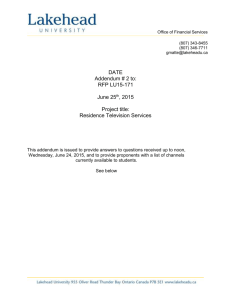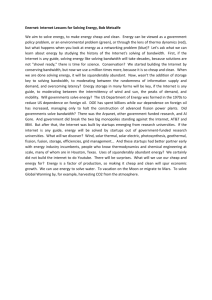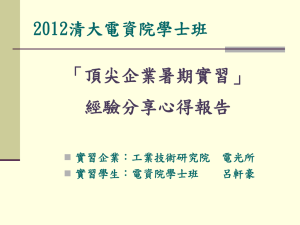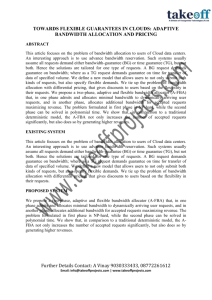Eron Broadband Services - Infocomm Development Authority of
advertisement
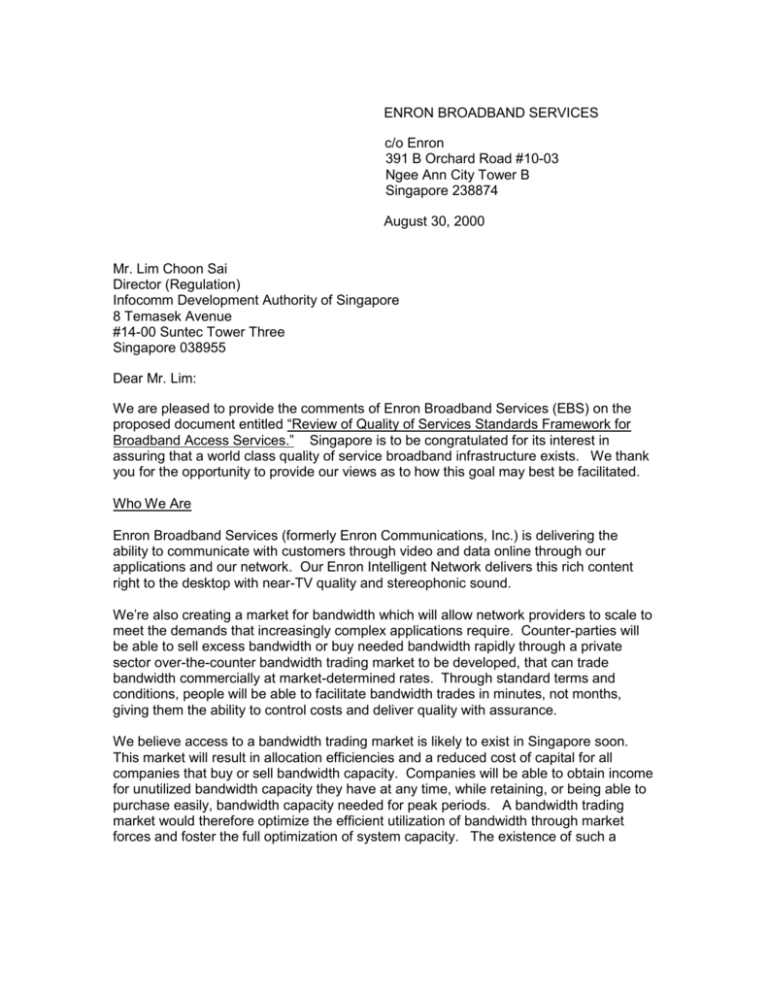
ENRON BROADBAND SERVICES c/o Enron 391 B Orchard Road #10-03 Ngee Ann City Tower B Singapore 238874 August 30, 2000 Mr. Lim Choon Sai Director (Regulation) Infocomm Development Authority of Singapore 8 Temasek Avenue #14-00 Suntec Tower Three Singapore 038955 Dear Mr. Lim: We are pleased to provide the comments of Enron Broadband Services (EBS) on the proposed document entitled “Review of Quality of Services Standards Framework for Broadband Access Services.” Singapore is to be congratulated for its interest in assuring that a world class quality of service broadband infrastructure exists. We thank you for the opportunity to provide our views as to how this goal may best be facilitated. Who We Are Enron Broadband Services (formerly Enron Communications, Inc.) is delivering the ability to communicate with customers through video and data online through our applications and our network. Our Enron Intelligent Network delivers this rich content right to the desktop with near-TV quality and stereophonic sound. We’re also creating a market for bandwidth which will allow network providers to scale to meet the demands that increasingly complex applications require. Counter-parties will be able to sell excess bandwidth or buy needed bandwidth rapidly through a private sector over-the-counter bandwidth trading market to be developed, that can trade bandwidth commercially at market-determined rates. Through standard terms and conditions, people will be able to facilitate bandwidth trades in minutes, not months, giving them the ability to control costs and deliver quality with assurance. We believe access to a bandwidth trading market is likely to exist in Singapore soon. This market will result in allocation efficiencies and a reduced cost of capital for all companies that buy or sell bandwidth capacity. Companies will be able to obtain income for unutilized bandwidth capacity they have at any time, while retaining, or being able to purchase easily, bandwidth capacity needed for peak periods. A bandwidth trading market would therefore optimize the efficient utilization of bandwidth through market forces and foster the full optimization of system capacity. The existence of such a - 2 - market should further the policy aims of the government, while substantially reducing or eliminating the proposed role of the government in monitoring and enforcing capacity utilization. Specific comments: Setting of quantitative standards for capacity utilization The document states that: “the bandwidth utilization of all network links…must ideally be less than 75% loading for 95% of the time during peak hours (on a monthly basis)… As for the bandwidth utilization parameters, ISPs/IXSPs have to alert commercial broadband access service providers whenever bandwidth utilization of the terrestrial link reaches 75%. Should the bandwidth utilization exceed the 90% loading level, IDA will require the broadband access service provider to immediately purchase additional bandwidth, unless it is able to justify to IDA’s satisfaction that the existing arrangement is the best under the current constraints and limitations.” EBS understands the public policy concern that the government has for insuring that firms have sufficient bandwidth to meet consumer needs. However, EBS believes government should not mandate quantitative standards in this area. Certain artificial market dislocations may result from the proposed quantitative bandwidth standards, as illustrated below. We believe government should seek to achieve its policy objectives through broader policy means by making sure the enabling environment is present in which firms will be able to acquire sufficient bandwidth on their own. First, firms will be very interested on their own to secure additional bandwidth when they approach full capacity utilization of the bandwidth they have. They need only a well developed bandwidth trading market in which this can occur. The government should focus on encouraging the development of such markets, rather than on setting, monitoring, and enforcing quantitative utilization requirements. Second, by its proposed approach, the government may be building itself a role which is too heavily involved in operational and commercial detail. Who can say what the threshold should be when a firm must acquire additional bandwidth? With a robust bandwidth trading market, it can be at any level of capacity so long as there are means to bring additional bandwidth into use rapidly. If bandwidth can be acquired in minutes, firms can (and commercially, should) go higher than 90% utilization before acquiring more. If additional bandwidth capacity takes months to arrange, to assure seamless availability firms may need to start the process when they are at less than 75% capacity. - 3 - Third, the setting of quantitative standards for capacity utilization can lead to overinvestment in the cable network and underinvestment in all other value added services to use the network. If the bandwidth market is relatively undeveloped, firms may be forced to spend money on building or acquiring more capacity to satisfy the capacity utilization requirements and less money on developing new uses for the network. As stated in a recent expert work on this subject, “Governments that prematurely set standards run the risk of being rendered obsolete by technological developments and of constraining innovation by the private sector. Government standard-setting bodies and international groups should therefore work closely with industry groups to set voluntary and flexible standards for electronic commerce.” [Catherine L. Mann, et al, Global Electronic Commerce: A Policy Primer, Institute for International Economics, Washington, D.C., July 2000, p. 190] For these reasons, rather than establish a burdensome monitoring regime with mandated actions, the government, in our view, should encourage the development of market institutions such as bandwidth trading which will let the private sector achieve for itself the government’s objective of rapid acquisition of additional bandwidth. EBS would be pleased to brief the government on the concept of bandwidth trading and would encourage the government to acquire this information broadly as well. Sincerely yours, (signed) David Merrill General Manager, Government Relations (Asia) Phone: (65) 9635-3311 (65) 838-9473 E-Mail: david.merrill@enron.com

